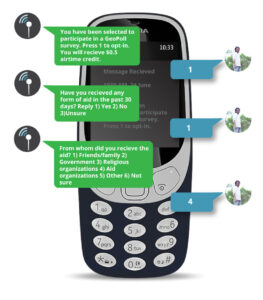In October 2021, the World Health Organization (WHO) recommended the malaria vaccine for at-risk children under the age of five. The recommendation is based on the results of an ongoing pilot program that began in 2019 in the high-transmission countries of Ghana, Kenya, and Malawi. The program involved more than 800,000 children.
An effective malaria vaccine has the potential to change the face of children’s health in high-burden countries. More than 260,000 African children succumb to malaria each year. “This is a historic moment. The long-awaited malaria vaccine for children is a breakthrough for science, child health and malaria control,” said WHO Director General Dr Tedros Adhanom Ghebreyesus. “Using this vaccine on top of existing tools to prevent malaria could save tens of thousands of young lives each year.”
GeoPoll SMS Malaria Vaccine Survey
To explore parents’ thoughts and reactions to this potentially revolutionary vaccine, GeoPoll is conducting an SMS mobile phone-based survey in several high-burden malaria countries: three from the original vaccine trial (Ghana, Kenya, and Malawi), as well as Nigeria, the Democratic Republic of the Congo, Uganda, and Mozambique. By comparing trial and non-trial countries, the SMS survey will help determine if news of the trial was widespread and affected parents’ perceptions of the vaccine.
 SMS surveys have the potential to reach a wide range of individuals across countries in a timely manner. As such, the surveys can be used to provide quick insights into the reactions to new global health tools and to help “take the pulse” of the situation.
SMS surveys have the potential to reach a wide range of individuals across countries in a timely manner. As such, the surveys can be used to provide quick insights into the reactions to new global health tools and to help “take the pulse” of the situation.
Social and Behavior Change Theory
The questions in this survey are grounded in Social and Behavior Change (SBC) theory, drawing on elements of the Health Belief Model (HBM) and the Theory of Planned Behavior (TPB). Key questions around perceived susceptibility, perceived severity, perceived barriers, and self-efficacy derive from the HBM framework, while questions stemming from TPB include attitudes towards behavior, subjective norms, and perceived behavioral control.
GeoPoll considered it crucial to ground the survey questions in SBC theory to help inform communication interventions. As witnessed in the current COVID crisis and additional research on vaccine hesitancy around the world, the availability and supply of vaccines is not enough. Demand is also crucial – and including SBC communication efforts in key interventions may help increase demand.
Subscribe to Updates
GeoPoll looks forward to following up this blog entry with a post-survey discussion of the research findings and implications. It is our hope that this study will provide insights into possible areas for further exploration and kickstart additional research by a wide range of organizations.
To be notified when GeoPoll releases the findings from this malaria vaccine study or other studies around the globe, please enter your email below. For more information about GeoPoll’s research capabilities or to request pricing for custom studies, please contact us.
